Iranian President Masoud Pezeshkian declared that he would use his power to prevent the morality police from harassing women, particularly in regard to enforcing strict dress codes. This pledge came on the second anniversary of the death of Mahsa Amini, a 22-year-old Iranian Kurd who died in police custody after being arrested for violating these dress rules. Amini’s death sparked nationwide protests in Iran, resulting in the deaths of hundreds of individuals, including security personnel, as well as the arrest of thousands of demonstrators.
Pezeshkian, a reformist who took office in July following the death of ultraconservative Ebrahim Raisi, stated during a press conference that the morality police were not meant to confront women and that he would ensure they did not bother them. He had promised during his campaign to oppose police patrols enforcing the mandatory hijab headscarf and to relax internet restrictions that had been tightened in response to protests in 2019 and following Amini’s death.
The Islamic Republic has a history of tightly controlling internet use, blocking popular social media platforms like Facebook and imposing strict restrictions on online activities. Pezeshkian’s government is working to ease these restrictions, particularly on social media, in an effort to grant more freedoms to the Iranian people. The recent wave of protests and unrest in response to Amini’s death highlighted the deep discontent within the country and the need for change.
In addition to promising to alleviate internet restrictions, Pezeshkian also pledged to address the issue of enforcing strict dress codes for women. The mandatory hijab headscarf has long been a controversial issue in Iran, with many women pushing back against this requirement. By vowing to oppose police patrols that enforce these rules, the president is signaling a shift towards more liberal policies that prioritize individual freedoms and rights.
The death of Mahsa Amini and the subsequent protests were a turning point in Iran, shedding light on the issues of police brutality and the suppression of basic rights in the country. Pezeshkian’s commitment to addressing these concerns and his efforts to advocate for greater freedoms for women and online users mark a significant departure from the policies of previous administrations. The path towards reform and progress in Iran may be challenging, but the president’s willingness to speak out and take action is a positive step forward.
As Iran continues to grapple with internal unrest and international pressures, Pezeshkian’s leadership will play a crucial role in determining the country’s future trajectory. By advocating for women’s rights, relaxing internet restrictions, and pursuing a more liberal approach to governance, he aims to create a more inclusive and forward-thinking society. The legacy of Mahsa Amini and the sacrifices made by those who have fought for change will not be forgotten, and the push for reform will continue as Iran navigates a complex and uncertain political landscape.


